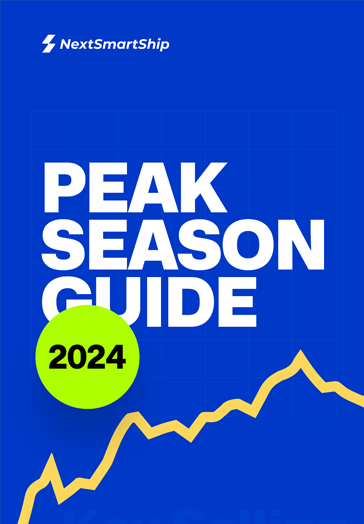The bulk of eCommerce retail sales occur in the holiday period between Black Friday and Christmas. While it presents a lucrative opportunity for profit, you shouldn’t presume a windfall, because you may be disappointed. Without a proper eCommerce holiday fulfillment strategy, you’ll miss out on all the fun. To effectively satisfy the deluge of customers who’ll flock your platform in the holiday season, you must prepare
Table of Contents
- Optimize your distribution network
- Be creative
- Check your stock
- Get ready for the holiday rush
- Review in real-time
- Holiday fulfillment mistakes to avoid

Optimize your distribution network
It’s a fair assumption to say peak demand during the holidays will be 30 times higher than it is at other points of the year. Your success during this period won’t depend on having products to ship, but shipping them at the appropriate time, to the right customer, and through the proper channels. The pre-holiday slump in revenue provides an excellent opportunity to evaluate your distribution network and eliminate weaknesses.
The role of supply chain associates, such as 3PL partners is crucial at this point. You need to discuss how they will adapt to increasing sales volumes and take the necessary steps to sync their processes with yours to create a seamless flow of orders to your customers.
Be creative
Major couriers such as UPS, FedEx, and others advise online retailers to finalize their pre-Christmas delivery arrangements by mid-December. Such constraints suggest the current delivery system cannot scale in response to the new demand. It may be wise, therefore, to innovate or at least consider a two-pronged approach. For example, you could continue with existing channels and ecosystems for sales from your portal, and prepare additional fulfillment centers for peak season. You’d better partner with a third-party fulfillment company for support during peak seasons.
Check your stock
Regardless of the efficiency of your order management system, and the resilience of your supply chain, if a product is out of stock, it can’t be shipped. You should ensure there are sufficient quantities of merchandise in your fulfilment centers. Review current stock levels, particularly for the products you are currently promoting. It will help to invest in data analytics software so you can anticipate customer sentiment.
Get ready for the holiday rush
You should get your platform ready for a dramatic increase in traffic early on. Invest in extra server capacity to ensure your site is not overwhelmed by the rise in demand, and test your site rigorously for speed and functionality. It may be wise to take down extensive graphics and similar elements that may affect page-load speed. A slow-loading page is terrible for two reasons: it frustrates your customers and causes a decline in search engine rankings. You’ll want to prepare PPC campaigns beforehand and ensure that your portal is mobile friendly.
Your delivery terms and conditions should be clear. Allow your customers to review the options available, choose their preferences, and edit delivery time and other parameters without making exaggerated claims and impossible promises. Inform your customers whenever it seems unlikely that orders will be delivered to a particular area on time. Online shoppers prefer honesty to deception.

Review in real-time
Even the best strategies are liable to fail in the real world, so you’ll need to follow the order fulfillment process in real-time. You may entrust competent team members with the responsibility for particular checkpoints in the order fulfillment process and develop a contingency to address unexpected errors.
It will also help to monitor the order fulfillment workflow and intervene to prevent potential bottlenecks. You’ll want to continuously monitor the shipping and fulfillment process, identify delayed deliveries, and implement measures to fix the problems identified, on an hourly or daily basis. Don’t overlook the returns process. It’s better to address rejected orders as they come.
Holiday fulfillment mistakes to avoid
While it’s impossible to predict every eCommerce fulfillment and shipping problem. There are common mistakes you can and should avoid.
Not telling your customers about carrier cutoffs
Holiday sales come with shipping deadlines. Most courier services in the United States, for instance, have 14th December as the cutoff for packages meant to arrive before Christmas. This date may vary depending on your warehouse location and the order’s destination. In general terms, orders must be placed ten days early for deliveries to occur in time for a particular holiday. If you don’t tell your customers about cutoff dates, you could get into trouble.
Suppose an order comes in on the 23rd November with the gift wrap, and free ground shipping options chosen, and the customer leaves the message “happy thanksgiving, mom loves you.” if you didn’t specify carrier cutoff dates, you may have to call the customer and inform her that it won’t arrive on time for thanksgiving. You’ll probably lose the order.
Failing to cope with order volume
Let’s assume it takes your warehouse staff 8 minutes to prepare an order for shipment. If you have 5 person team working eight hours each day, you can ship nearly 300 orders a day at maximum capacity. Impressive – until you’ve got 600 orders.
One of the biggest problems with a growing eCommerce business is that it is often inundated with orders during peak seasons and can’t meet the demand. The best solution here is to make arrangements beforehand. As mentioned earlier, you could partner with a third-party fulfillment service company to handle the load during peak seasons. 3PL companies will also help you manage packaging material, as they are more likely to anticipate how much you’ll need during peak periods.
Giving false shipping estimates
While you verify your customers’ addresses, you need to check the rates as well. Your business should routinely audit its shipping estimates and compare them to actual shipping costs.
An inaccurate shipping quote has two pitfalls. If the quote is too low, you’ll have to make up for the difference. If it is too high, the customer will probably abandon their cart.
Failure to authenticate delivery addresses
A false zip code won’t just delay shipping. It may make your package irretrievable. To avoid this problem, you should deploy an address authentication system. If something looks unusual, call the customer for clarification.
Online shoppers expect timely deliveries, so, for eCommerce stores that offer tangible items, order fulfillment is a crucial task. While it becomes tough during the holiday shopping season, with the advice covered here, you’ll be fully prepared to meet your customers’ expectations.



